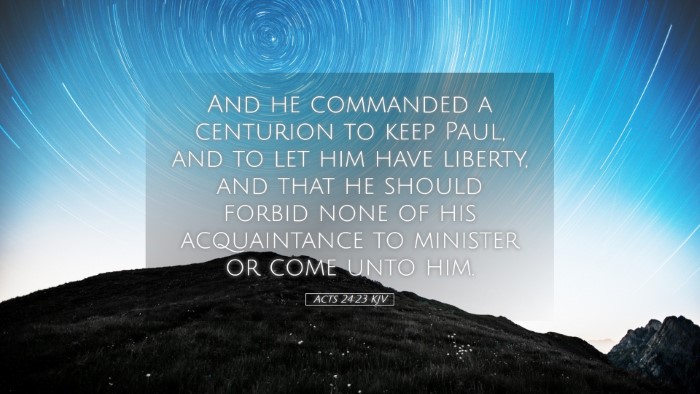Old Testament
Genesis Exodus Leviticus Numbers Deuteronomy Joshua Judges Ruth 1 Samuel 2 Samuel 1 Kings 2 Kings 1 Chronicles 2 Chronicles Ezra Nehemiah Esther Job Psalms Proverbs Ecclesiastes Song of Solomon Isaiah Jeremiah Lamentations Ezekiel Daniel Hosea Joel Amos Obadiah Jonah Micah Nahum Habakkuk Zephaniah Haggai Zechariah MalachiActs 24:23
Acts 24:23 KJV
And he commanded a centurion to keep Paul, and to let him have liberty, and that he should forbid none of his acquaintance to minister or come unto him.
Acts 24:23 Bible Commentary
Commentary on Acts 24:23
Acts 24:23 reads: "And he commanded a centurion to keep Paul, and to let him have liberty, and that he should forbid none of his acquaintance to minister or come unto him."
Introduction
This verse, part of the narrative detailing Paul’s trial before Felix, provides insight into the treatment of Paul as a prisoner and the implications of his situation. By examining the command Felix gives to the centurion in charge of Paul, we can explore themes of authority, liberty in bounds, and the nature of Christian witness under persecution.
Overview of Context
Acts 24:23 occurs in the broader context of Paul’s defense against accusations from the Jews. After his arrest in Jerusalem and subsequent transfer to Caesarea, Paul stands before the Roman governor, Felix. This verse illustrates how Felix, while holding Paul under custody, also allows him certain freedoms that reflect both political strategy and personal considerations.
Analysis of Key Themes
-
Authority and Governance:
Luke highlights the role of Felix as a Roman authority. By commanding a centurion to allow Paul certain liberties, Felix showcases a ruling power that is somewhat benevolent. Matthew Henry notes that the governor's intervention provides a contrast to the more hostile environment Paul faced in Jerusalem.
-
Liberty in Confinement:
The phrase "let him have liberty" resonates with the idea that even in restricted conditions, believers can maintain a degree of freedom. Adam Clarke emphasizes that while Paul was technically a prisoner, he was still afforded an opportunity to engage with friends and supporters, which enriched his spirit and testimony.
-
The Right to Fellowship:
Felix's command that none of Paul's acquaintances be forbidden to visit him indicates a recognition of the importance of community in the life of a believer, especially during trials. Albert Barnes argues that this access allowed Paul to continue his ministry and receive encouragement during his confinement.
Theological Implications
From a theological perspective, this verse affirms the idea that God's servants can find ways to fulfill their mission despite adverse circumstances. Paul’s liberty to interact with others serves as a reminder that divine purposes can be accomplished even within human constraints. The relationship between divine providence and human authority is also evident here; as Felix unknowingly plays a part in God's plan for the early Church.
Application for Pastors and Theologians
This passage serves as a rich resource for preaching and teaching, particularly in discussing how individuals can remain steadfast and engaged in faith communities despite struggles. It encourages pastors to create spaces for fellowship and support, especially for those facing persecution or imprisonment for their faith.
Additionally, theologians might explore the implications of freedom within restrictions, pondering questions about how modern believers experience and navigate challenges that inhibit full expression of their faith. Such discussions can greatly contribute to understanding ecclesiology and the role of the church in a secular society.
Conclusion
Acts 24:23 serves as a poignant reminder of God’s presence and providence in our lives, especially in trying times. It encourages believers to seek fellowship and maintain their witness for Christ, regardless of their circumstances. The insights from Matthew Henry, Albert Barnes, and Adam Clarke collectively enrich our understanding of this verse, making it invaluable for academic study and practical application in the life of faith.


